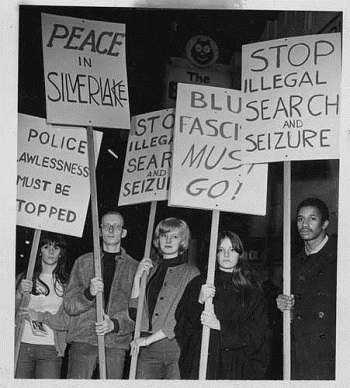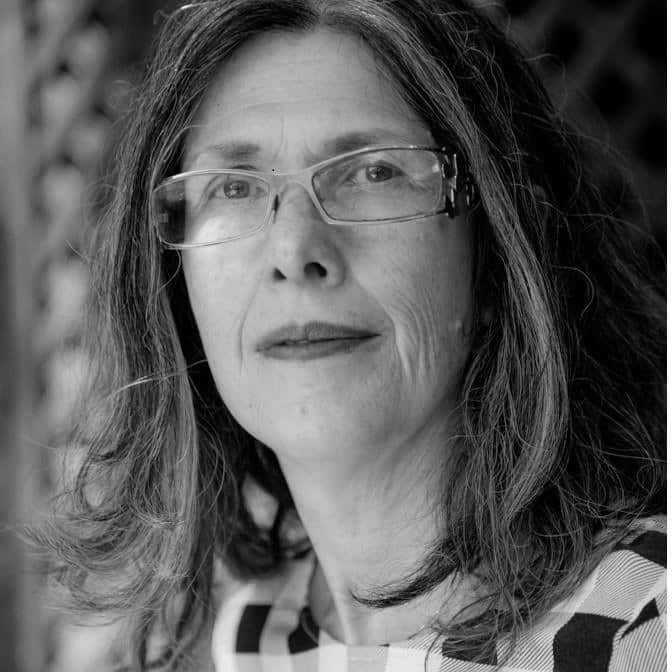
The Motzei Tu B’Shevat moon shined down on the Black Cat Tavern in Silverlake as the week began. Hundreds of picketers lined the sidewalk carrying signs that read “End Illegal Entrapment,” “Peace in Silverlake,” and “Blue Fascism Must Go.” The signs were re-creations in honor of a much more dangerous picket line held 50 years previous on this very spot.
That picket, two years before the Stonewall Rebellion, marked the emergence of today’s gay/LGBTQ civil rights movement. Silverlake residents staged a peaceful protest after a police raid bloodied the floor of the Black Cat, then a gay bar. On New Year’s Eve 1966/7, plainclothes police officers, who had infiltrated the party, battered then arrested people who had come to celebrate. The raid left people with broken bones, ruptured organs and bleeding wounds. Two of the arrestees, Charles Talley (embodied Saturday night by brilliant writer and performance artist Michael Kearns) and Benny Baker, appealed their convictions based on 14th Amendment guarantees of equal protection under the law. The Supreme Court declined to hear their case and so, for a three-second kiss (the duration was attested to by the police officers who had made the arrest) the two men were forced to register as sex offenders.
Weeks later, on February 11, 1967, some of the first modern gay activists picketed the bar. They made every effort to keep things peaceful and legal—always walking, not loitering, keeping to the sidewalk, not letting one piece of litter touch the ground. Alexei Romanoff (no relation to the unlamented Czar—in fact a Jewish immigrant from Ukraine), who had helped to organize the event, remembers just what an act of extraordinary courage was performed by every single picketer: “Three months before these raids, there was an anti-Vietnam War protest on the Sunset Strip. It was met with violence. The police beat up the protesters, it was violent. Straight people wanted to do something about police brutality. Mexicans were getting beaten up, blacks were getting beaten up, anti-war protesters, the hippies were getting beaten up.” (Thirsty in L.A., June 12, 2015).
What stunningly brave people those early protesters were. Romanoff reminds us that, in 1967, homosexuality was considered by many “enlightened” people to be an illness-the less enlightened regarded gay people to be acceptable outlets for whatever violent bullying impulses they wished to follow. To publically walk a picket line in defense of gay rights—to be the lawyer who went to court on behalf of gay people—was to risk shunning, financial ruin, and brutal violence.
50 years later, the picket line was reenacted. Many of the signs were copied from photographs of the originals, but there were new signs as well marking this gathering as a manifestation of today’s resistance: “Love Trumps Hate,” and “You Build a Wall, We’ll Tear it Down,” and some referred to other historical protests, “Silence = Death.” This time, the police, including two openly gay officers, were there as allies. The rally, organized by Silverlake residents (including Wes Joe, the widower of my late Shabbat chavruta Avram Chill, Z”L) was supported and assisted by openly gay City Council Member Mitch O’Farrell and by Mayor Eric Garcetti. (I run into our mayor in all the best places; at the bar mitzvah of his Chief of Staff’s son, where he took an Aliyah, at the Islamic Center of Southern California where he offered solidarity in the face of the imminent travel ban and other attacks, and here at a queer rally, where he spoke along with our openly gay City Controller Ron Galperin (who happens to be a great cantorial soloist and who stood with his husband, Rabbi Zach Shapiro of Temple Akiba). I hope that our mayor, whom I sense to be a profoundly decent man, paid close attention to those young people who chanted at him, “We’re the voice of the new generation; we are sick of gentrification!” May this second term be the one in which he builds on last year’s ballot measures to take on our housing crisis full throttle.
Openly gay actor Wilson Cruz reminded us that while we celebrate our victories and acknowledge our allies, we have work ahead of us that must be faced. He reminded us that, as praiseworthy as a the LAPD support for our rally is—and it does represent an amazing transformation—as a movement, we are still obliged to address the mass incarceration of men of color in our country. Speaker after speaker spoke to the fact that, for the LGBTQ movement, intersectional politics just must means facing reality. When we talk about persons of color, about women—about Jews—we are talking about a group in which we are included.
As we coalesce for a long-term effort on behalf of immigrants, working people, people of color, women, LGBTQ people—and religious minorities, including Jews as well as Muslims—we can take strength from the extraordinary bravery of those people who marched quietly, in dignity, risking everything for what they knew was right. They were not only resisting brutality, they were standing up for love and justice and, yes, for morality.
On that day, Alexei Romanoff, the Jewish immigrant was joined by Tak Yamamoto, an American who, along with his Japanese immigrant family had spent most of World War II in a concentration camp devised by our government. These were people who knew first-hand what they were risking and they understood that declining to protest would be much more dangerous. May they be our teachers in the days and months and years ahead.























 More news and opinions than at a Shabbat dinner, right in your inbox.
More news and opinions than at a Shabbat dinner, right in your inbox.